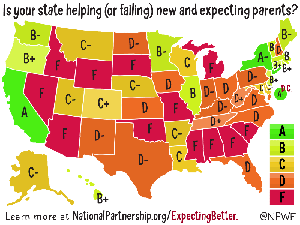
Workers in Arizona can get unpaid leave for the birth of a child – the minimum under the federal Family and Medical Leave Act, a shortcoming that led to the state’s failing grade in a national report. (Photo by Kat Grigg/Creative Commons)
WASHINGTON – Arizona received a failing grade for its policies to help expecting and new parents, only meeting the minimum federal standards under the Family and Medical Leave Act, according to a national report card released Wednesday.
It is not the first time Arizona has received an ‘F’ for its policies to assist working families – the state received the same grade when the last edition of the “Expecting Better” report was released in 2014, when it was one of 17 states that failed.
But while five of those states moved up in the latest report, Arizona remained mired at the bottom.
“Relative to other states that are taking action, Arizona hasn’t taken action,” said Vicki Shabo, vice president of the National Partnership for Women and Families, which released the report.
Arizona’s workforce
A snapshot of the state’s workforce, according to the National Partnership for Women and Families:
Dana Wolfe Naimark, president and CEO of the Children’s Action Alliance in Arizona, agreed that little is being done on the state level.
“I think it reaffirms that this has not been a focus for leaders in Arizona,” Naimark said. “It’s something that has really gotten very little traction or discussion in our state and no policy action.”
The partnership used the federal Family Medical Leave Act as the benchmark and scored states based on whether or not they adopted policies that went beyond the federal minimum.
Under FMLA protections for workers, employers are required to give eligible workers up to to 12 weeks off in a year for the birth of a child, a serious health condition, to take care of a seriously ill family member, or for an emergency concerning a military family member on active duty.
The report examined 14 policy categories for private sector and state employees, ranging from state policies for paid sick leave to pregnancy accommodations. In addition to the 12 states that got an ‘F,’ another 15 earned a grade of ‘D.’
California was the only state to receive an ‘A.’
Shabo said Arizona has followed a national trend of state legislatures curbing local efforts to set policies that could help working families. She added that a lack of policies in Arizona ultimately come at a cost, both for families and for the state – and disproportionately affect women.
“We know that lack of paid family leave, lack of access to paid leave has negative impact on women’s workforce participation,” Shabo said, adding that that could impact how much women make in their careers and the number of new mothers on public assistance.

Arizona was one of 12 states to get an “F” for its policies on family leave for new parents or workers who are expecting. It was the same grade the state got in a 2014 report, and experts say little has changed in Arizona while other states moved forward. (Map courtesy the National Partnership for Women and Families)
More than 1.4 million women work in Arizona, making up about 46 percent of the state’s workforce.
And working parents aren’t the only ones affected – anyone in the workforce who may have to take a leave is affected, too. The report cited a MetLife study that found that workers over age 50 lost an average of $300,000 in retirement income and wages when caring for their parents.
“There are costs associated with the status quo and not having policies in place,” Shabo said.
But advocates said there is a more immediate impact on families.
“Any parent knows what big challenges there are in managing your work life and your family life, and the birth of a baby is certainly a critical time for any family,” Naimark said.
“For working families who really don’t have any paid leave, it’s extremely challenging. And for those who have really limited benefits it’s also challenging,” she said. “It’s definitely an issue that affects family life and children’s well-being.”